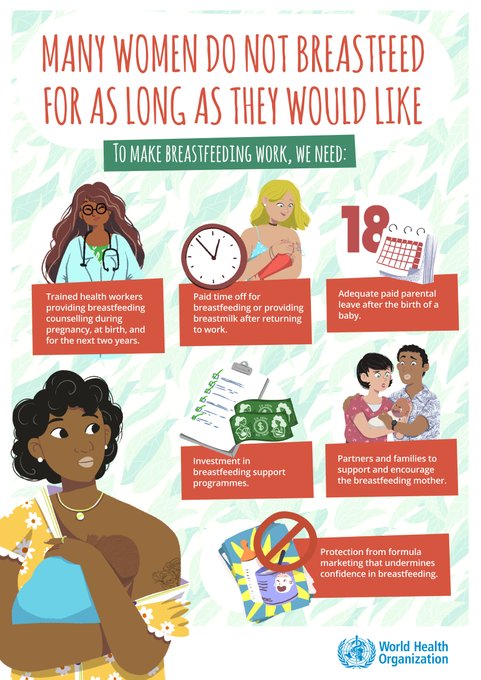Feeding Baby the Way Nature Intended
"The formula milk industry uses poor science to suggest, with little supporting evidence, that their products are solutions to common infant health and developmental challenges."Linda Richter, developmental psychologist, University of the Witwatersrand, South Africa“The promotion of commercial milk formulas should have been terminated decades ago.""The fact that formula milk companies are now employing even more powerful and insidious marketing techniques to drive up their sales is inexcusable and must be stopped.”Dr Francesco Branca, Director, WHO Nutrition and Food Safety"Evidence of exposure to and impact of digital breast-milk substitutes marketing was collected from several sources for this report. These include a systematic review of the literature, social listening research, a multi-country study of mothers’ and health professionals’ experience of breast-milk substitutes marketing, individual country reports of breast-milk substitutes promotions and an analysis of existing legal measures to implement the Code."World Health Organization
 |
| Video aid for breastfeeding Still from video |
The producers of infant formula represent a $55 billion-a-year industry, one that the World Health Organization has produced a three-paper series critical of the industry's misleading marketing and aggressive lobbying tactics. Published in the The Lancet medical journal, the report points out that makers of infant formula make unsubstantiated claims relating to their products.
Claiming these products are similar to natural breast milk in their properties, leading to the health of babies. Claiming as well that the milk powder is capable of easing discomfort infants may feel. The paper is a call for a crackdown in the industry focusing on claims that new products like hypoallergenic or organic formulas or formulas derived from the milk of sheep and goats being marketed implying they have special benefits with premium prices attached to their sale.
The targeting by the industry of health professionals, caregivers and families through pervasive social media, the promotion of formula as a positive choice while devoting immense public relations resources in lobbying against legislation meant to protect breastfeeding, has come under scathing condemnation by the World Health Organization.
A recall of products by Abbott Laboratories linked to contaminated products led to a nationwide U.S. shortage of infant formula which led to scrutiny of the entire issue. Concerns of the outreach of the global industry in developing countries in particular dates to the 1970s, when infamously the Swiss baby formula producer Nestle was held responsible for convincing impoverished women that baby formula was healthier for infants than breast milk.
Mothers who were convinced, or who wanted to adopt the kind of baby feeding popularized in wealthy nations, turned to infant formula. Because of the expense of a product to take the place of natural maternal milk that nature designed for biological survival that cost nothing, women took to watering down the formula to make it last longer and their children suffered from malnutrition as a result, delaying normal healthy developmental milestones.
 The WHO's 1981 International Code of Marketing of Breast-Milk Substitutes advising against free samples, setting standards for labelling was being violated. Among the most prominent manufacturers of infant formula are Nestle SA, Abbott, Reckitt Benckiser Group, Danone, China Feihe Ltd. and Dutch dairy co-operative Royal Friesland Campina. For all of these global corporations, the bottom line is of more importance than the health of the globe's infants.
The WHO's 1981 International Code of Marketing of Breast-Milk Substitutes advising against free samples, setting standards for labelling was being violated. Among the most prominent manufacturers of infant formula are Nestle SA, Abbott, Reckitt Benckiser Group, Danone, China Feihe Ltd. and Dutch dairy co-operative Royal Friesland Campina. For all of these global corporations, the bottom line is of more importance than the health of the globe's infants.The WHO report charged that the consumption of commercial formula has been normalized, as a result of the strenuous public relations success of the corporations producing the products. Despite scientific evidence of breastfeeding's superior energy and nutrients babies imbibe, while reducing the risk of infection and lowering rates of future obesity and chronic later-life diseases. Fewer than half of infants under six months of age are breastfed exclusively.
"Within health we need to acknowledge the influence of corporate power in prescribing practises", pointed out health campaigner pediatrician Guddi Singh, at a WHO briefing. In place for decades, WHO's marketing code for formula has been unable to stem the sales of baby formula. Legal measures substantially in alignment with the code only exist in 32 countries.
 |
| UNICEF/Rabik Upadhayay
A mother donates her breastmilk at the first human milk bank to open in Nepal. |
Labels: Baby Formula Industry, Breastfeeding Baby, Immoral Advertising, Unethical Public Relations, WHO

0 Comments:
Post a Comment
<< Home